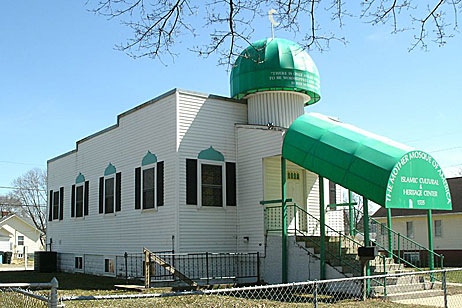
RNA - On a church-lined street in this eastern Iowa city, not far from the cornfields that define the region, Syrian, Indian and Somalian families trickled into a white building topped with a blue minaret. They were full of questions and praying for answers.
“This is a wake-up call,” Ramsey Ali, a 29-year-old graduate student, told the crowd of 50 gathered at the Islamic Center of Cedar Rapids. “We have to do something.”
These heartland Muslims, who belong to one of the oldest Muslim communities in the United States, had gathered in search of relief and unity.
Instead, they found themselves just as divided as the rest of the nation.
Since Donald Trump's election, dozens of mosques have hosted emergency forums like the one held here Saturday, trying to calm congregations fearful and confused over their prospects under his presidency. Top imams have convened conference calls and strategized with civil rights groups over what many see as the inevitable assaults on their faith. Some Islamic groups have cautiously vowed to work with the new president, while others have called on him to repudiate his statements on Islam — a faith he just months ago said “hates” Americans.
In Cedar Rapids, the second-biggest city in Iowa, the debate over life under Trump has taken on extra meaning. Muslims, who number about 5,000 in Linn County, are a small minority in the region of 218,000 people yet deeply ingrained in its history.
The community dates to the early 1900s, when small groups of Muslims and Christians immigrated from what is now Lebanon. They worked in grocery stores and local industries and saved to build a two-story social club that opened in 1934 near downtown. The Muslims also used it as a mosque and in 1971 built a larger building, where the community met last week. The original mosque, called the Mother Mosque, is still used for special events and stands in a neighborhood just west of the Cedar River that last week was scattered with Trump-Pence signs. Around the mosque, signs proclaim it as a state landmark.
“We survived a world war, we survived 9/11,” said Hassan Igram, 61, whose grandfather helped found the mosque. “But this situation is a little different.”
Before Trump was elected, with the help of a victory in Iowa, he had at points vowed to ban Muslims from immigrating, said he was open to government spying on certain mosques and once said he would “absolutely” have a registry of all Muslims. Since his win, civil rights groups have raised alarms about a jump in attacks on Muslims and other minorities across the country by Americans emboldened by the new presidency. Some Trump supporters also have been hurt in scuffles.
At Cedar Rapids’ Islamic center, where about 150 people usually attend weekly Friday prayers, families streamed in on Saturday with their kids for an event titled "Raising a Family in the Times of Fear.” It was ostensibly a potluck dinner and slideshow presentation about how to talk to children about fears of Islam. It was led by Ali, a psychology doctoral student at the University of Iowa.
In actuality, it was group therapy for adults and high schoolers in shock over the election and wondering about their future.
As congregants sat at tables in front of a projector, eating rice pilaf and kebabs, Ali presented a series of data points and guides. They covered anti-Muslim violence, mental health among Muslims, and civil rights resources.
But mostly, he peppered them with questions about their state of mind. The group talked for hours as it gradually dwindled in size, interrupted only by the recorded sounds of the call to prayer over the mosque speakers.
847/940